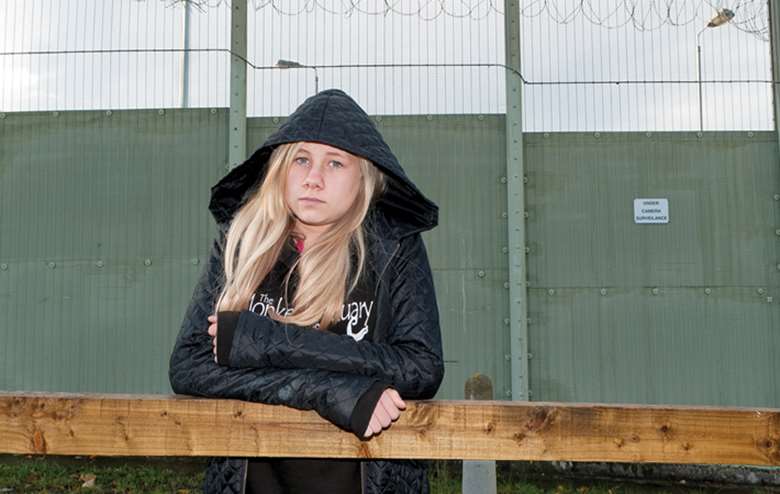Time to end cycle of offending
Neil Puffett
Tuesday, December 9, 2014
Better support for the children of prisoners could make it less likely they offend themselves, say campaigners.

Momentum is growing for support for families of prisoners to be stepped up in order to improve outcomes for children.
According to the most up-to-date estimate, about 200,000 children in England and Wales have a parent in prison at some point every year.
Research has found that children of prisoners are twice as likely to experience conduct and mental health problems, and are less likely to do well at school. They are also three times more likely to be involved in offending, with 65 per cent of boys with a father in prison going on to offend themselves.
Alarmed by the statistics, campaigners have long called for more to be done to identify and support young people affected by parental imprisonment, and it seems that both Labour and the Conservatives are now starting to listen.
In September, shadow justice secretary Sadiq Khan pledged that a Labour government will ascertain how many children have a parent in prison. And last month, Conservative youth justice minister Andrew Selous said he will meet prison governors to discuss what more prisons can do to support families of prisoners.
So what are the areas that need to be addressed?
Identification
Andy Keen-Downs, chief executive at the Prison Advice and Care Trust (Pact), says a combination of efforts to speed up court processes and changes to the probation service means that many children are being "left behind" by not being identified.
In the worst scenarios, children whose mothers have been sentenced to custody unexpectedly have been left waiting at the end of the school day with nobody to pick them up.
Keen-Downs's organisation wants courts in England and Wales to be statutorily obliged to ask whether those sent to prison have children and ensure that adequate care arrangements are in place - a stance that is supported by Barnardo's.
In the meantime, it is launching guidance for courts next month advising magistrates to take the opportunity to ask about dependent children during hearings. This can allow the opportunity for a parent to make a simple phone call to speak to wider family about kinship care arrangements. If nothing can be arranged, the local children's services department can be contacted.
"There needs to be time in the system for those arrangements to be put in place," Keen-Downs says.
Community-based support
Barnardo's says schools are an important place for support and counselling to be offered.
"Many children with a parent in prison feel so stigmatised and ashamed that they tell no one, so it's difficult to help them," Barnardo's assistant director of policy Neera Sharma says.
"Schools often don't know about these children's situations.
"Some of the schools we work with have appointed champions who are points of contact for children and this is something all schools can replicate."
Keen-Downs says "nominated" people within schools can ensure that those with a parent in prison are offered appropriate care and support.
"Some children will start displaying very difficult behaviour," he says. "If they have experienced a police raid and having a parent taken away, they can suddenly nosedive and exhibit all types of challenging behaviour.
"It is important that schools signal to parents and carers that they won't be judged, the information will be treated with discretion and they will work with them to provide the best possible support."
Prison-based support
There are already a number of support projects running at prisons around the country that could be extended further, say campaigners.
Lesley Dixon, practice development manager at Action for Prisoners Families, points to youth projects run in visitor centres in the North East, where the North East Prison After Care Society provides dedicated "youth rooms" for young people aged eight to 18 at three prisons, while one-to-one support is available for young people who are affected by the imprisonment of a parent or close relative.
"Children affected by parental imprisonment need to have someone to talk to," Dixon says.
Meanwhile, the Prison Family Support Alliance, a group of organisations including Pact, has introduced family engagement workers in women's prisons who are able to assess a mother's family situation and arrange for suitable prison-based and community based support to be provided. There are also successful schemes being run within prisons developing fathers' parenting skills and forming an attachment with their baby.
"These are people who may be in prison, but if they have children, they will eventually go home and be a parent again," Dixon says.
"It is important you prepare the offender and the family for that."
Besides expanding these schemes, Dixon suggests visiting times should be more flexible, potentially outside of office hours, so children do not necessarily have to take time off school.
In numbers
86,000 – the current adult prison population
200,000 – the number of children each year who have a parent in prison
3 times – the rate children of prisoners are more likely to be involved in offending behaviour than peers
65% of boys with a father in prison will go on to offend themselves
Source: Prison Family Support Alliance and Barnardo's




